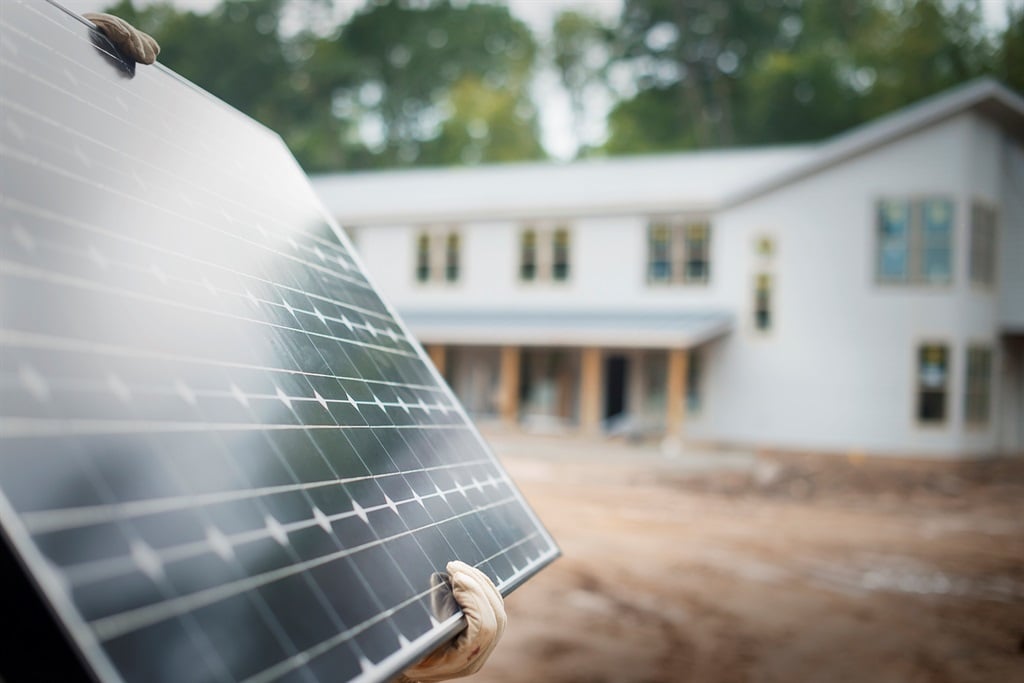
The worsening load-shedding crisis is causing homeowners to seek alternatives to Eskom's electricity supply.
Many consumers have since opted for Solar power, an attractive option if you're considering an entry-level solution to survive power outages or looking to get completely off the grid, according to consumer finance website, JustMoney.co.za.
Owners of standalone homes have leeway when installing solar power systems. But what rules and regulations should you consider if you live in a residential estate or complex?
Property specialists James Honiball at Eagle's Landing Estate Homeowners' Association and Retha Kriek at Rozewood look at what homeowners in a complex should know about when moving to solar power.
Homeowners' associations and sectional title body corporates may regulate installations, says Retha Kriek, managing director of boutique property management agency Rozewood.
"Body corporates are managed under the Sectional Titles Schemes Management Act, which is very specific about how common property must be managed, and how approval must be given for installations of items on the common property," said Kriek.
When installed on common property, solar panels are typically placed on the complex's roof or carports. Every solar request requires a special general meeting, with 33% of owners or their proxies present. At least 75% of those in attendance must vote in favour of the resolution.
Kriek says conduct rules can be amended, but the Community Schemes Ombud Service (CSOS) must approve these new rules.
"In the case of private installations, the body corporate should ensure there are rules and a framework that makes it easier for owners to receive approval for solar installation," she says.
"Given the current circumstances in our country, this should be treated as an emergency, not a discretionary requirement for units.
"If the body corporate is of sufficient size, it can approach suppliers that install solar solutions for the complex as a whole. There are options to fund such installations, with rebates on the rates for owners – although this isn't feasible for smaller complexes due to economies of scale."
Owners governed by a homeowners' association will need to study the conduct and architectural rules within the memorandum of incorporation, says Kriek.
"The homeowners' association would have to recognise the need to update their rules if they don't make provision for electricity."
Kriek says you don't need governmental permission to install solar panels.
Considerations for complexes
James Honiball, chairperson and director of Eagle’s Landing Estate Homeowners’ Association, says there are several options for energy conservation that complexes can consider.
- Renting solar panels for common areas, rather than purchasing them outright, can reduce upfront costs and the risk associated with owning and maintaining panels.
- Sharing systems or costs with neighbouring properties or developments can dilute costs.
- Installing batteries to help store excess energy generated by solar panels and making it available for use during periods of high energy demand or when the panels are not generating electricity.
- Encouraging residents to upgrade their appliances to more energy-efficient models, such as Energy Star-rated appliances. This will reduce the complex's overall energy consumption.
- Installing smart meters that can provide real-time information on energy consumption and help residents understand the need to reduce their energy usage.
Selecting a solar installer
The interest in solar power has also created opportunities for fly-by-night operators, as this sector is unregulated.
The Consumer Goods and Services Ombud (CGSO) office reports an increase in the number of complaints related to buying and installing solar systems and generators.
The CGSO received 202 complaints between February 2022 and 9 February, 2023. These include compliance certificates not issued, payment accepted but goods undelivered, and systems not installed within agreed time frames. In addition, almost half of these suppliers refuse to cooperate with the office when it conducts investigations.
Insuring your solar system
In a sectional title scheme, the unit is indicated on a sectional title plan that is registered in the Deeds Office. A homeowners' association is administered as a non-profit company and is governed by the Companies Act. Insurance in a sectional title complex is added to the complex insurance as part of the common property and recovered from individual owners. With a homeowners' association, the owner is responsible for insuring the solar system with their own insurer.
Shafeeka Anthony, Marketing Manager of JustMoney, reminds those living in residential estates or complexes that a cheaper solar option may not be the best choice in the long run.
Anthony offers the following tips when researching solar panel installers:
Determine your requirements: Establish your energy usage and needs.
Choose an established company: The installers should have at least three years' experience, technically competent staff, and efficient post-installation service. Check reviews and request contactable references.
Shop around: Obtain three quotes with comparable information on system size, price, brand and model, and estimated energy production.
Agree on an installation schedule: Don't pay upfront and wait weeks for the team to arrive.
Get a warranty: The panels should come with a manufacturer's warranty, but you will also require a warranty on the installer's work.
Choose the right financing option: Banks, and bank-approved solar suppliers, market solar panel payment packages. These include rent-to-own, outright equipment purchase, a subscription service, and paying for generated electricity only. Determine the best choice for you.
"Taking energy security into your own hands is not cheap, as the initial costs can be extremely high," said Anthony. "Do thorough research and review your options to check you are not in the dark."
Questions may be edited for brevity and clarity.
Disclaimer: News24 cannot be held liable for any investment decisions made based on the advice given by independent financial service providers. Under the ECT Act and to the fullest extent possible under the applicable law, News24 disclaims all responsibility or liability for any damages whatsoever resulting from the use of this site in any manner.


